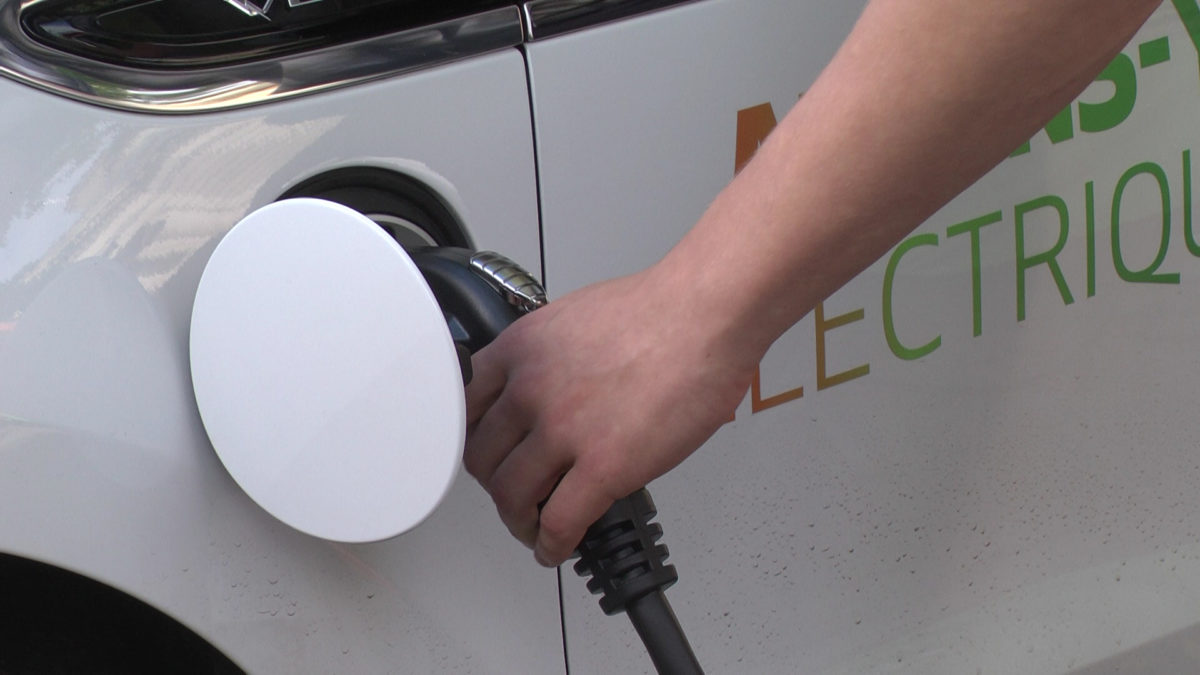
NB Power’s Shift Your Ride project has New Brunswick in a position to be among the first places where drivers can recharge their electric vehicles by hooking up to the energy internet and reaping the rewards of cheaper and cleaner energy.
“The prices are going down on electric vehicles, and demand is going up, but the grid and the infrastructure needs to be there for them,” said Diane Cole, communications officer at NB Power.
Electric vehicles, or EVs, from several manufacturers were available for test drives as part of Harvest Jazz and Blues on Saturday.
In the first two hours, 60 people had gone for an eight-minute lap around downtown Fredericton, and people were continually lured off the busy downtown streets for hours after.
Test drivers left the vehicles remarking how snappy, smooth and quiet the EVs are.
The trip cost the 2013 Ford C-Max approximately four cents in electricity, as calculated by the car’s on-board computer.
Andrew Secord, chair of the economics department at STU, is “cautiously optimistic” about the program, which began in June and is recently being noticed for the bright orange electric vehicle charge station in front of NB Power’s office on Queen Street.
Stations in Fredericton, Moncton and Bouctouche are available for use free of charge for NB Power customers who enroll in their pilot program.
“The main concern is that we not just stop burning gasoline and use electricity that comes from coal fired electrical generating plants. But that’s not NB Power’s intention as I understand it,” Secord said. “The hope is that we’ll be able to switch from fossil fuel burning automobiles and trucks and public transit over to electrical vehicles [which run on] renewable sources like wind and solar.”
Even if one is not inclined to dream big, the first steps of the project are a solid foundation to build on.
The project includes a review of municipal vehicle fleets. Five municipalities and the province’s Department of Transportation and Infrastructure will be logging travel data to find whether electric vehicles could be suitable replacements for combustion engines, and to map where charging stations would be best placed throughout the province.
The major sticking point for most car buyers with electric vehicles is the lack of driving time available from a single charge, and the lack of infrastructure to get them recharged in most places. This is called range anxiety.
“I think there are a lot of reservations from people about getting electric vehicles, because of that range anxiety,” said Cole. “We’re a big open province, and that’s really what’s difficult.”
Another problem is that if widely adapted, EVs will use too much hydro and cause problems with many cities’ electrical systems. Most batteries hold a large amount of electricity and take several hours to charge on a conventional home socket.
“You look at other markets, like in Ontario, where the demand went up fast, and it’s causing a lot worries over their infrastructure,” Cole said.
New Brunswick isn’t at the same stage as Ontario, or most of North America, in adopting fully electric and plug-in-hybrid vehicles. NB Power counts 17 consumers with registered EVs in the province. Including the utility company’s fleet cars, there are seven vehicles that use the quick-charge station in Fredericton.
The province lags behind in adapting electric vehicles, but is not stuck in the dark ages by any means.
David MacDonald, sales manager at Clark Chevrolet and Cadillac in Fredericton, said the Chevy Volt is still a small production batch, and they produce only “a few thousand at a time”.
“The volt is not a car they produce day in day out,” he says, noting that Clark has sold only two.
That’s not to say Chevrolet is being lethargic with moving into green energy. Chevrolet is about to knock another $5,000 off of the Volt’s price, despite taking a loss on every unit they sell.
An important next step essential to making EVs economically viable is to develop a smart grid. This is an electrical system that uses information from buildings, vehicles and electronics communicating with each other, the grid and the user to maximize efficiency.
Rather than being a burden to the electrical system and the owners’ bank account, EVs could be used to capture excess energy produced from intermittent renewables like wind and solar.
“A smart grid would be able to detect the source of electricity, and sell it to you at a lower price,” MacDonald said. “You can have a whole array of battery packs sitting in your house, waiting to get recharged, and they will wait until the wind is blowing.”
NB Power thinks the province has an advantage with the use of electrical vehicles.
“We have a really impressive communication network here that has been built up over the past couple of years. This kind of thing will negate the need to build more generators and things like that, and allow us to rely more on new renewable energy,” Cole said.
